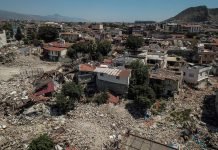Some key sectors of the emergency and recovery response in Turkey remain dangerously underfunded, including health, two months after devastating earthquakes struck the country’s southern provinces in early February, the International Organization for Migration (IOM) said in a press release.
“With health facilities and workers greatly affected by the earthquakes, as well as more than 100,000 people injured, the international community must prioritize support for Türkiye’s health care system as the country perseveres on the long road to recovery,” said Martin Legasse, IOM senior emergency coordinator in Turkey.
According to the IOM, an estimated 500 health care workers died in the earthquakes, hundreds have been injured and thousands left without a place to call home.
A 7.8-magnitude earthquake that struck near the Turkish city of Gaziantep – home to around 2 million people and on the border with Syria – as people were sleeping on February 6 was followed by dozens of aftershocks, including a 7.5-magnitude temblor that jolted the region in the middle of search and rescue efforts the same day.
António Vitorino, director general of the OIM, earlier called on the international community to increase its efforts to ensure aid keeps reaching the millions of people affected by the major earthquakes.
According to relief organizations, the impact of the earthquakes will be felt for months and years to come.
Around 2.7 million people remain internally displaced in the country, UNICEF Turkey said.
Shelter, water sanitation facilities, healthcare, protection (including mental health and psychosocial support) and continuity of learning remain priority needs, according to UNICEF Turkey.
The damage in Turkey alone could amount to over $100 billion, the UN said and launched a $1 billion funding appeal to support millions of people in Turkey.













